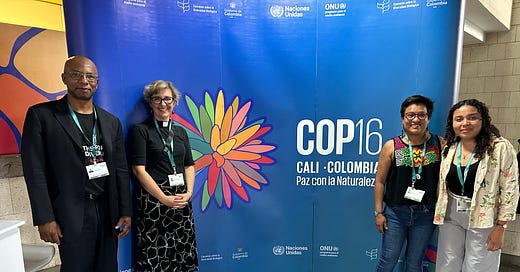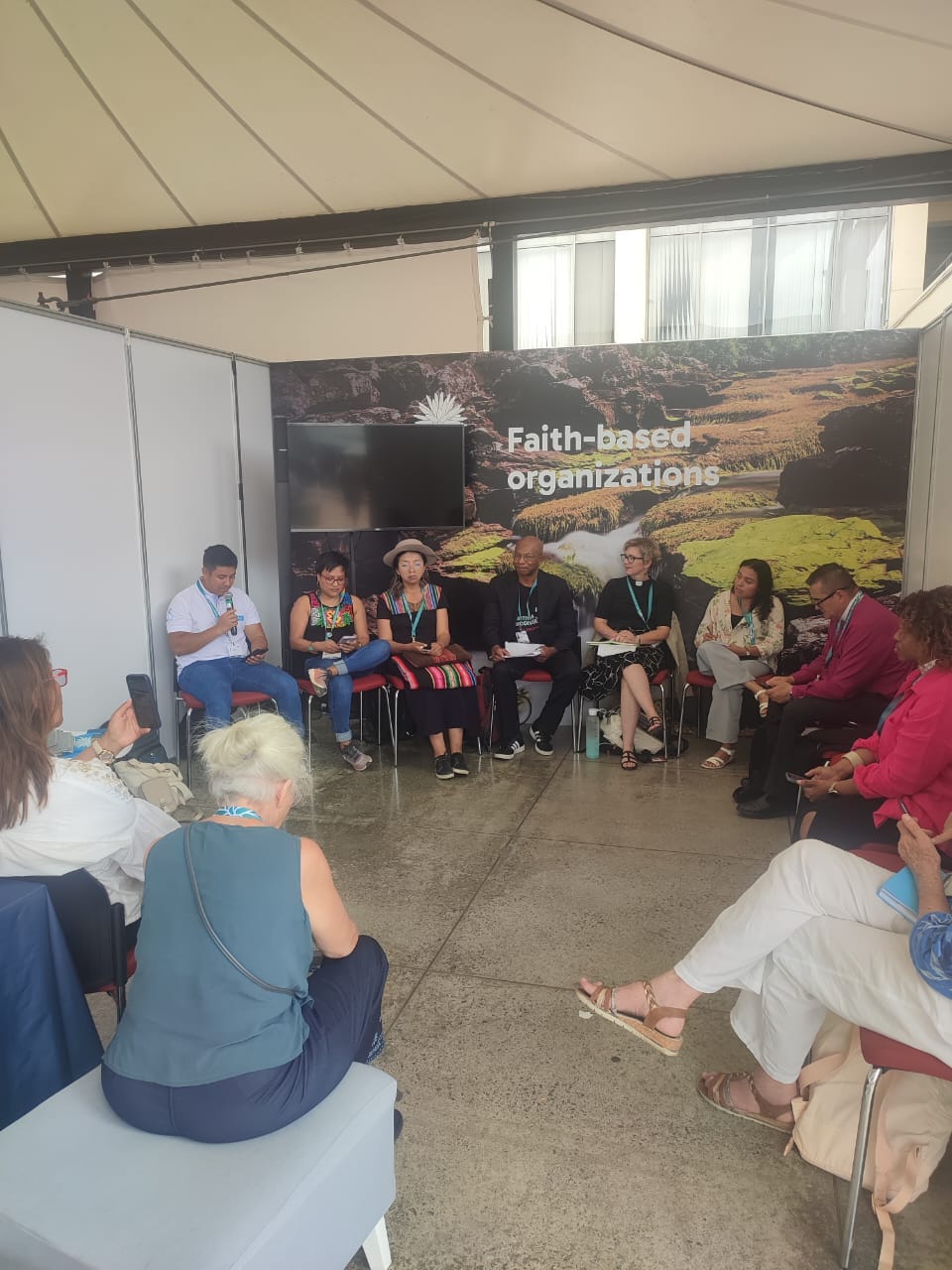From Grass Stalks to Grassroots: A Reflection in the Midst of COP 16
The UN Biodiversity COP 16 was an intense mix of high-level negotiations and community-level engagement. I'm still processing what I experienced.
COP 16 was two weeks long; I attended the second week with several other delegates from the World Council of Churches, representing the Commission of the Churches on Climate Justice and Sustainable Development. With me were (L to R) Louk Andrianos (from Madagascar and Greece), Jocabed Solano (Indigenous from Panama), and Karen Vega (from Colombia).
I’m back from an intense week at the UN Biodiversity COP 16 in Cali Colombia. I arrived home late on Saturday night and was in the pulpit the next morning, so I’m just coming up for air now! There is much to digest and share with you, and I know I didn’t send a newsletter on Friday. So this week I’m going to publish two newsletters about COP 16; today I want to share with you a brief reflection that I wrote during my time at COP 16, and on Friday I will tell you about some of the major accomplishments at COP 16 and reflect on them in light of faith and our call to discipleship of climate action.
I didn’t just stay in a convention centre at COP 16 all week; I also had the privilege of visiting a hummingbird reserve in the mountains near Cali on my last day. I’ll share that experience with you next week. Stay tuned!
We are in a climate and ecological crisis, and it’s all hands on deck... Subscribe to join a community of people of faith who care about climate action and find hope and encouragement at the same time!
A panel discussion on “Indigenous perspectives and ethical imperatives for Biodiversity and Creation Justice at COP 16” in the Faith Hub at COP 16. Part of the work of the grassroots.
From Grass Stalks to Grassroots: A Reflection in the Midst of COP 16
“Let your roots grow down into him, and let your lives be built on him.” (Colossians 2:7, NLT)
“From grass stalks to grassroots.” This was the phrase suggested to me when I described the two-way role that I see the church having in events such as Biodiversity COP 16 in Cali, Colombia. The grass stalks represent the role of heads of state and the high-level negotiations of a global agreement to protect 30% of the world’s biodiversity by 2030. At this level, I was stirred by the words of Colombian President Gustavo Petro, who opened his remarks during the High Level Segment on Tuesday, October 29 with these words: “We are at the beginning of human extinction. When I say this, it is not an exaggeration.” I then felt convicted by UN Secretary-General António Guterres who told the world that biodiversity loss is an existential crisis, from which no country is immune.
Yet, the stalks cannot grow without the roots, nor can they be strong without being rooted deeply within the soil. So it is that the grass stalks of COP 16, all of the high-level policy-making and negotiations, must be supported, nurtured, and fed by the grassroots of the people to whom states and global bodies are accountable.
Here at COP 16, the grassroots is represented in various and diverse spaces: Indigenous communities and organizations; faith-based organizations including Faiths for Biodiversity, which hosted the Faith Hub and welcomed the World Council of Churches delegates; and a wide range of civil society groups. Most exciting for me were the conversations that I participated in with Indigenous leaders from around the world, who have been protecting 80% of the world’s biodiversity. As well, the Green Zone was a delightful and inspiring surprise! It is a dynamic space open to the public to encourage ecological education and citizen participation in understanding the issue of biodiversity loss and the myriad ways in which regular people can work for the protection of the Earth community. Seeing everyone welcome to participate in COP 16 via the Green Zone filled me with the hope that we can empower people everywhere to take action to prevent further biodiversity loss and protect what is left.
Paul says, “Let your roots grow down into him, and let your lives be built on him.” The grassroots is where Jesus spent his time, where he broke bread, offered healing, and showed us what it means to have our roots deep in him. The abundant life promised to us in Christ Jesus comes from the grassroots.
It is at the grassroots where the energy, power and support will come for biodiversity protection. While the words of President Petro and Secretary General Guterres, words at the grass stalk level, are exciting and empowering, unless states and global bodies connect with and take their direction from the grassroots, the ability to achieve the goal of protecting 30% of biodiversity by 2030 will be severely limited. The grassroots level, especially among Indigenous and local communities, is an essential part of the response to biodiversity loss and protection.
This is the WCC’s first year as a delegate to a Biodiversity COP, and it is the exact right time, especially now that the Commission of the Churches on Climate Justice and Sustainable Development has been formed, and within it the Biodiversity and Creation Justice Working Group. The World Council of Churches is uniquely poised to bring together two often disparate worlds, high-level policy-making and grassroots organizing. We can hold the grass stalks and the grassroots in prayer. We can facilitate important conversations, such as around the need to hold up the rights and leadership of Indigenous people in biodiversity protection. And we can remind those in power, those of the grass stalks, that they can only find their strength and be able to achieve the goals of biodiversity protection if they ground and take their direction from the grassroots.
This post is free for all subscribers. If you’d like the full range of inspiration and encouragement in your journey of faith-based climate action, consider upgrading to a paid subscription!









https://www.noemamag.com/its-time-to-give-up-hope-for-a-better-climate-get-heroic/
I can't get excited about these international conferences anymore. They are not working and we are running out of time. We need more honesty and less emphasis on hope IMO. Can we find ways to pull together and carry on, even though things are crumbling all around us? We have no choice but to try.